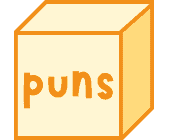A pun is a joke or saying that makes a play on words. It exploits the meaning or uses words that sound similar.

Pun definition
A pun is a humorous play on words. Puns rely on words that have similar spelling, meaning, or sounds. Another word for a pun is paronomasia.
Related: The funniest puns about puns
It’s a noun that can also be used as a verb. When it comes to writing or speaking, puns are an excellent way to add humor and entertain people.
It has also been around for a long time, as the first known use dates back to the 1600s.
Related: 105+ terrible puns that are so bad they’re amazing
Different types
There are different types of puns you can use. The following are the four main types.
1. Homophonic
A homophonic pun uses words that sound the same but have different meanings. For example, my motorcycle didn’t work because it was two-tired. The pun interchanges “too” with “two.”
2. Homographic
A homographic pun uses words that are spelled the same way but have different meanings. It’s also called a heteronym pun, which means the same name. An example is, can February March? No, but April May. It’s funniest when it’s read because they’re true interpretations of the words.
3. Compound
Compound puns contain multiple puns in the same sentence. It can be homophonic, homographic, or both. For example, geology rocks, but geography is where it’s at. Geology is about rocks, and it’s cool. Geography is about locations, and it’s even better.
4. Visual
As the name suggests, a visual pun relies on images or graphics. For example, the Box of Puns logo is literally a box of puns. Visual puns are also known as graphological puns.
Examples
If you need some inspiration to make puns, read the following examples:
- Towels can’t tell jokes because they have a dry sense of humor.
- I bought a boat because it was on sail.
- One lung told the other, “we be-lung together.”
- Waking up this morning was an eye-opening experience.
- Since I started sleeping in the fireplace, I’ve slept like a log.
Now that you’ve read some examples, you can start crafting puns.
Conclusion
Puns aren’t only for humor and entertainment. They’re also excellent for increasing your creativity.
If you want someone to laugh when you’re talking or writing, learn how to craft top-notch puns because it’ll help you do so.
To make a good pun, increase your vocabulary and pay attention to words. With practice, you’ll become a pun master.
Related posts:
- Gneiss rocks puns
- The best banana puns
- The best cherry puns
- Hilarious money puns
- Hilarious “what do you call?” jokes
Featured image courtesy of Canva.
